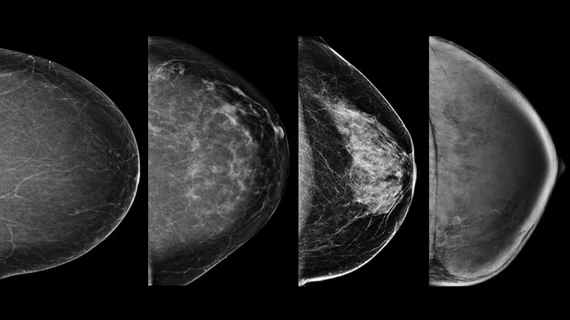How do hormonal contraceptives affect breast density?
Does the use of hormonal contraceptives affect a woman’s breast density on mammographic imaging?
In the long-term, it does not impact breast density status for late reproductive-age women, according to new research. However, there may be an initial increase in breast density immediately following the initiation of oral or intrauterine hormonal contraceptives, experts recently shared in a new paper published in Clinical Imaging.
Corresponding author of the paper Jonathan T. Hunt, with the Women's Health Institute at Cleveland Clinic, and colleagues note that the debate on associations between exogenous hormones and breast cancer risk is a longstanding one, but that it does not fully account for more recent developments in contraceptives, such as the emergence of lower dosing and progestin types. How these developments affect breast density is an important consideration, as an increase in density category increases cancer risk.
“Similar to family history, the use of exogenous hormones and breast density are important components of breast cancer risk assessment,” the group wrote. “Given that at least one out of five reproductive age U.S. women use hormonal contraception, this study aimed to describe the longitudinal relationship between the use of contraceptive dose hormones and mammographic density in a late reproductive-aged cohort.”
For their work, the team included data from 708 women ages 35 to 50 who underwent five or more screening mammograms within a 7.5-year period between 2004 and 2019. The women were placed in one of four categories based on their exposure to hormonal contraceptives—never exposed, always exposed, interval hormonal contraceptive start and interval hormonal contraceptive stop.
Compared to those with no exposure, those with long-term use of combined oral contraceptives or a levonorgestrel intrauterine device did not display an increase in breast density category. Initiation of hormonal contraceptives was associated with an increase in density category but, conversely, discontinuation was not associated with a decrease in density in those continuously exposed.
Although initiation did result in an increase in density, the researchers note that this could be a transient effect and that, overall, the use of hormonal contraceptives in this age group of women has little impact on their mammographic breast density.
They suggest that the results of their work are especially relevant given the long-term and diverse data included in their research. The experts also propose that their results “should help reassure individuals who are concerned about the impact of their preferred contraceptive method on breast cancer screening.”
The study abstract is available here.

